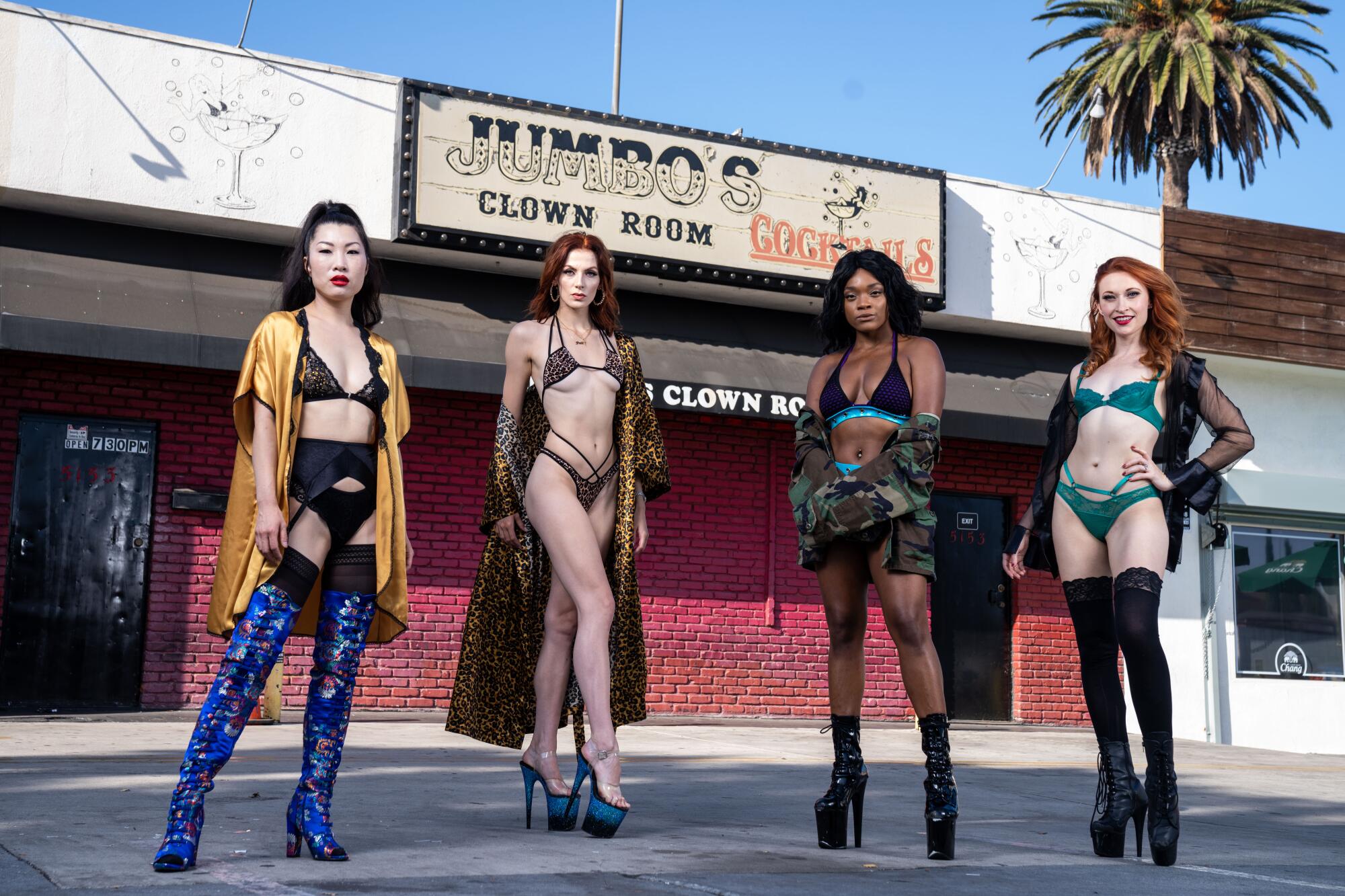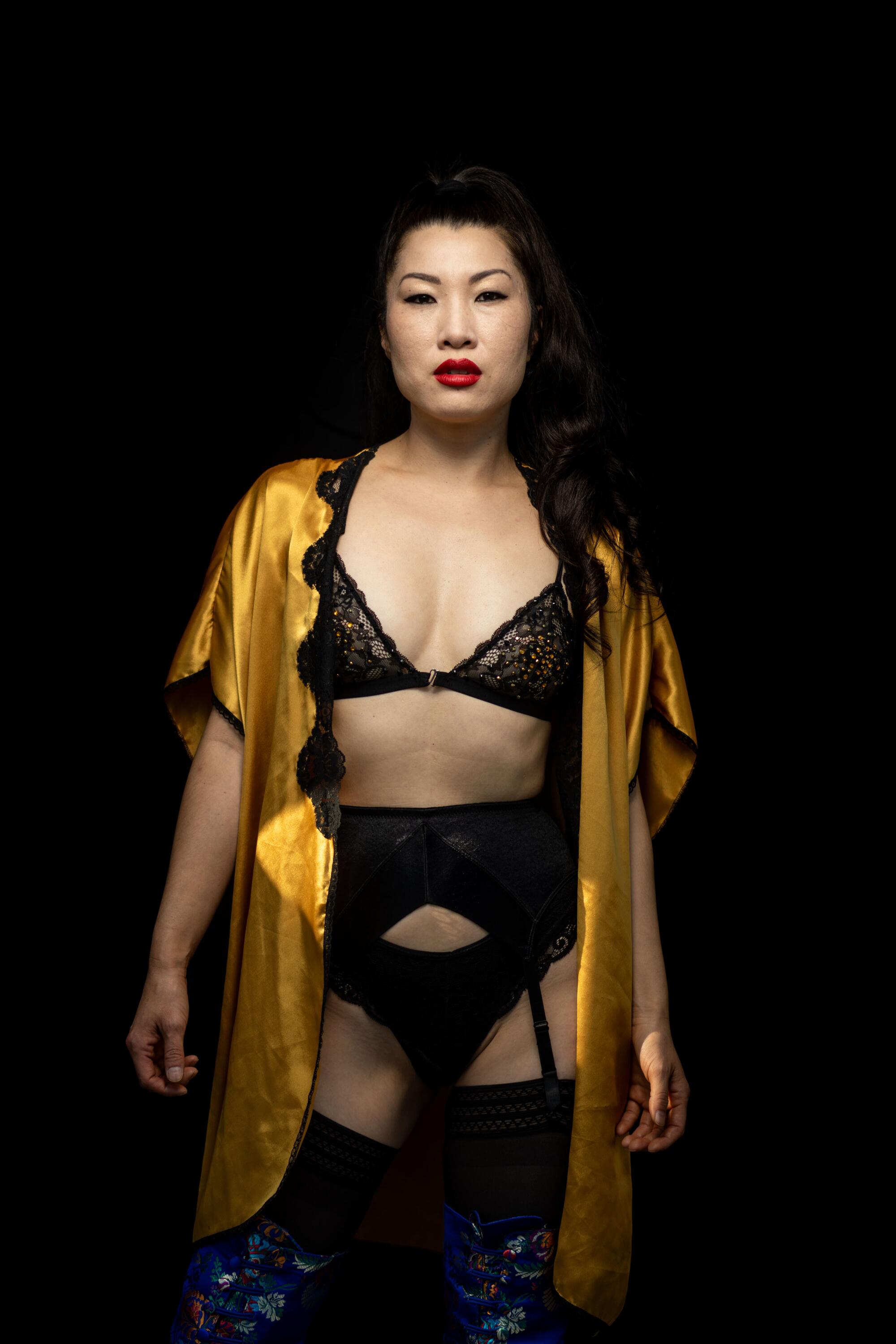
It was in the early days of the COVID-19 pandemic when a group of dancers from the East Hollywood hipster strip club Jumbo’s Clown Room realized no one was coming to save them.
After the club closed in March, they were waiting on a call, “for someone to swoop in and take the reins and tell us what to do,” said the performer who goes by Reagan (real name Megan Rippey). “Then we realized that we were those people.”
In early May, one Jumbo’s dancer named Gabrielle reached out to a few of her coworkers to create a virtual strip show. And within 24 hours they launched Cyber Clown Girls, which has now become a twice-weekly three-hour show featuring current dancers and alumni from Jumbo’s, and other performers from exotic dance communities. (Tickets to the Zoom show are sold through Eventbrite.)
Co-founded by Gabrielle, Reagan, Coco Ono (real name Kayla Tange) and Kitty, the Stripperina (real name Kelly Vittetoe), the show has given the strippers a new sense of agency and empowerment in an industry that is notorious for taking advantage of women. Although they emphasized that Jumbo’s is a supportive environment run by women, other strip clubs can be exploitative.
“We’ve all heard the horror stories of pay cuts being really unfair, favoritism, having to do certain favors for them that made a lot of performers feel uncomfortable,” Coco Ono said. “All these things we no longer have to deal with, which is pretty great.”
The co-founders take turns hosting and performing in the virtual show. Each follows a theme — “Star Wars,” disco and funk, “A Midsummer Night’s Dream” — and features a different lineup of dancers who perform two short pieces in their homes. Some dancers use portable poles, and others make creative use of bathtubs, windowsills, cars or apartment corners transformed by a makeshift set.
Like an in-person strip club, viewers (about 100 for each show) are encouraged throughout the night to tip the dancers using payment platforms like Venmo or Cash App. The tips are eventually pooled and split evenly among all the performers.
The show is, of course, sexy. Dancers strip down to pasties and G-strings, or to their birthday suit, with some strategic covering. But mixed in with the stripping is a level of zaniness, edge and political commentary.
In one show, Kitty performed a pole number in a cow costume — complete with sparkler-enhanced udders — and accidentally set part of her living room on fire. Another act by the dancer who performs as Susan B. Sketchy was a take-down of gender-reveal party culture.

Coco Ono is a performance, burlesque and installation artist who has performed at the nonprofit arts space Human Resources Los Angeles, REDCAT and Art Basel Miami Beach. Her work often explores societal taboos, food fetish and her Korean heritage.
“Strippers in general are often insanely creative people,” said Reagan, who has an MFA from CalArts. With online shows, “we are our own creative directors, we’re our own art directors, we’re our own cinematographers, lighting designers, set designers.”
And with nightlife still on pause, “all these creative outlets that we used to have don’t exist anymore,” she continued. “So this is necessary, it’s for our mental health.”
The show has also provided an outlet to be vocal about social justice.
Over four months and 40 shows, the Cyber Clown Girls have donated more than $12,000 to organizations including the Sierra Club, Planned Parenthood and the Marsha P. Johnson Institute, a nonprofit dedicated to protecting Black transgender people. The group would not divulge how much they receive in tips, but admission to each show is $5 to $20.
After author J.K. Rowling was criticized for transphobic tweets, the strippers donated a portion of proceedings from their already-planned Harry Potter-themed show to the Trevor Project, an organization dedicated to suicide prevention for LGBTQ youth.
“When we performed live, we didn’t have hosts to really explain some of the dancers’ backgrounds and things that we were fighting for,” Coco Ono said. “We were just bodies.”
In the loud club setting, the dancers didn’t get the chance to speak about their experiences and the issues that mattered. Online, in between sets, they can directly engage with their audience about how they’re feeling and why the group chose to donate to a particular organization.
“I think people are really inspired and maybe in a little bit of awe that strippers care so much,” Reagan said, laughing.
They work in an industry that attempts to control their weight, their look, their music choices. But online, there’s a new kind of freedom and independence.
“We don’t tell anybody what to do,” Coco Ono said. “We embrace all sizes, shapes, looks, styles, and that’s just so liberating to not have to worry about any of those things anymore.”
Cyber Clown Girls is part of a wave of inclusive, stripper-run virtual shows including a Native-owned strip and variety show, Cyber Sinferno, and a trans-owned and trans-inclusive show, Jolene. Coco Ono recently launched Sacred Wounds, a show centering Asian performers, and Reagan has also launched a solo online show, Janky Glamour.
Performing to a camera has its perks. The dancers, to the best of their knowledge, can command their audience’s full attention. It’s easier to deal with harassment. There’s no need for a muscled security guard; an audience members who is disrespectful can get kicked out of a show with a simple click. And learning new technologies has given strippers more avenues to control their livelihoods.
But working entirely online comes with its challenges. Stringent censorship standards on Facebook and Instagram can make it difficult to promote virtual shows. And the group is struggling to find sponsors, including categories that would seem to be obvious fits, such as alcohol brands.
“A lot of them don’t want to be associated with strippers. They don’t want their name on our brand,” Kitty said.

“Every sexy woman, definitely every stripper, is facing these crazy, impossible standards of the internet where your account could be shut down,” Reagan said. “You could immediately lose in two seconds your entire following and your entire means of income.”
She cited SESTA/FOSTA — the 2018 federal law aimed at online sex trafficking that adult entertainers and sex workers say has criminalized their work — as particularly detrimental.
Gabrielle, who makes a living through several online platforms, said a bikini picture was flagged and deleted by Instagram. “My appeal has been sitting there for months,” she said. “I wasn’t nude and my stuff was taken down for being nude.”
It’s frustrating, the group said, especially seeing celebrities turn to sex worker culture and the stripper aesthetic to enhance their image.

Actress Bella Thorne recently apologized to sex workers after joining the subscription platform OnlyFans. Performers who used the platform said she took business from people who needed the site to make a living.
Other celebrities, including FKA twigs and Jennifer Lopez, have faced criticism for incorporating pole dance into their artistry without having to experience the stigma strippers face. They don’t “have to deal with any of the actual backlash of actually living this life on a daily basis,” Coco Ono said. “They never get deleted for posting dancing at the Super Bowl.”
The pandemic has forced many strippers to be more open about their work.
Before the pandemic, Kitty, who has also performed with the dance company Luminario Ballet of Los Angeles, would upload posts about her work at Jumbo’s that were sexy, but in a subtle way. Now, her Instagram is more overt.

“I put the pole up in my living room and I had all these videos up, and then I started losing followers.” She had to make a choice — continue being open about the way she makes a living or appease the people who are less open to that part of her life.
There’s a reclaiming of what it means to be a stripper — even the word “stripper” — the collective said, adding they plan to continue their virtual show indefinitely.
“I feel like I can’t even go all the way back, having this kind of control over the audience and not having to work for somebody,” Reagan said. “Taking the power back in an industry that often takes power away from women and dancers.”
Cyber Clown Girls
When: Wednesdays, Saturdays
Admission: $5-$20, plus tips encouraged
Info: Ticket link to the show is posted on Instagram, www.instagram.com/cyberclowngirlsshow
More to Read
The biggest entertainment stories
Get our big stories about Hollywood, film, television, music, arts, culture and more right in your inbox as soon as they publish.
You may occasionally receive promotional content from the Los Angeles Times.











